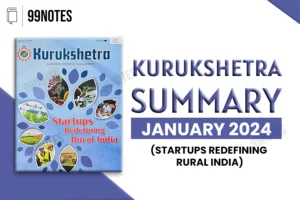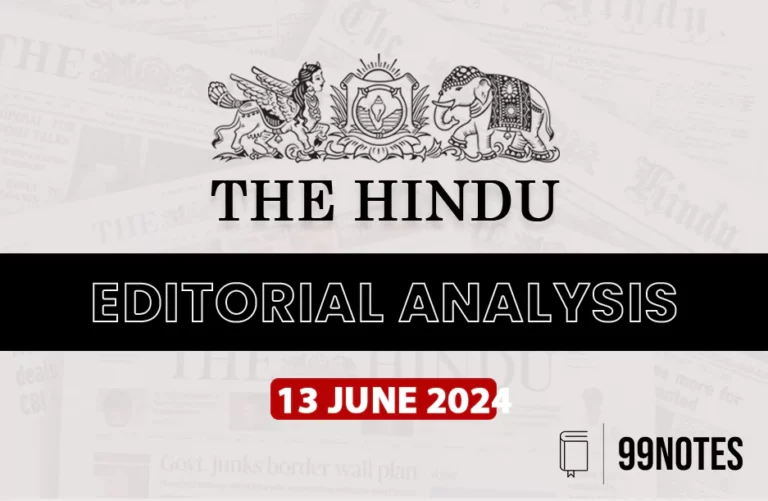18 March 2024 : The Hindu Editorial Notes PDF
The Hindu Editorial
18-March-2024
1. Many elections, AI’s dark dimension
|
Topic: GS2 – Governance GS3 – Science & Technology – Development & their applications From a UPSC perspective, understanding AI’s impact on elections is vital for grasping technological and democratic challenges in governance. |
| Context |
| ● The article discusses the transformative potential of Artificial Intelligence (AI), particularly in electoral processes, highlighting concerns over disinformation, manipulation, and the need for cautious handling of AI’s evolving capabilities to safeguard democratic principles. |
Rise of AI and Its Implications:
- Rapid advancement in AI suggests a shift in human progress towards AGI, potentially mimicking human capabilities, revolutionizing technology and human interaction.
- AI, deemed by some as the most crucial technology in history, promises to enhance living standards but raises concerns regarding undermining human values and posing existential risks.
AI in the Electoral Landscape:
- The upcoming 2024 elections globally, including India’s, necessitate consideration of AI’s impact on electoral dynamics.
- AI’s latest manifestations, such as Generative AI, introduce new dimensions to electoral behaviour and outcomes.
- Elections may serve as a testing ground for AI’s influence, potentially altering electoral behaviors and outcomes.
AI’s Disinformation Challenges:
- AI tools can amplify disinformation, creating near-realistic falsehoods that may overwhelm and confuse the electorate.
- Hyper-realistic Deep Fakes and micro-targeting techniques pose significant challenges to the integrity of electoral processes.
- AI’s potential to disrupt democracies underscores the need for effective countermeasures to prevent AI-driven manipulation of voter sentiment.
Addressing AI’s Risks:
- While AI’s potential is vast, its inconsistencies and unreliability, coupled with inherent dangers like adversarial capabilities, demand cautious handling.
- India, as a digital frontrunner, must recognize AI’s disruptive potential while leveraging its benefits, especially in the context of AGI’s unpredictable nature.
- Prudent measures and checks are necessary to mitigate the risks associated with AI deployment, especially in critical domains like elections.
Conclusion:
- AI’s evolution towards AGI poses both opportunities and challenges, particularly in electoral processes where disinformation and manipulation threaten democratic principles.
- India’s digital leadership demands a balanced approach, leveraging AI’s benefits while safeguarding against its disruptive potential and inherent risks.
| Possible ways to control AI intervention in elections |
|
Potential Impact: ●AI can amplify disinformation, leading to voter manipulation and erosion of democratic principles. ●Deep Fake technology may create realistic but false narratives, influencing public opinion and electoral outcomes. ●Micro-targeting techniques enable tailored messaging, exacerbating polarization and divisiveness within societies. ● AI-driven bots and algorithms can spread propaganda, misinformation, and fake news at scale, undermining trust in electoral processes. Way Forward: ● Implement robust regulations and oversight mechanisms to monitor AI use in electoral campaigns. ● Foster transparency and accountability in AI deployment through clear guidelines and ethical standards. ●Invest in AI detection tools to identify and combat disinformation campaigns and Deep Fake content. ●Promote media literacy and public awareness programs to educate voters on AI manipulation tactics. ●Collaborate with tech companies to develop AI algorithms that prioritize factual information over misinformation. ● Strengthen cyber security measures to safeguard electoral infrastructure against AI-enabled attacks. ● Foster international cooperation to address global challenges posed by AI in elections. ●Enhance legal frameworks to adapt to evolving AI technologies and address emerging issues effectively. ●Engage civil society organizations and academia to research and advocate for solutions mitigating AI’s negative impact on democratic processes. |
|
PYQ: With the present state of development, Artificial Intelligence can effectively do which of the following? (2020) 1) Bring down electricity consumption in industrial units 2) Create meaningful short stories and songs 3) Disease diagnosis 4) Text-to-Speech Conversion 5) Wireless transmission of electrical energy Select the correct answer using the code given below: (a) 1, 2, 3 and 5 only (b) 1, 3 and 4 only (c) 2, 4 and 5 only (d) 1, 2, 3, 4 and 5
Ans: (b) |
| Practice Question: Discuss the implications of Artificial Intelligence (AI) advancements on electoral processes, including challenges and strategies for safeguarding democratic integrity. (250 Words /15 marks) |
2. The Election Commission must ensure a free and fair democratic process
|
Topic: GS2 – Polity – Indian Constitution – Significant provisions Understanding electoral processes, fairness, and institutional challenges is crucial for UPSC aspirants to comprehend India’s democratic functioning. |
|
Context |
|
● The article discusses the announcement of the 18th Lok Sabha election in India, spanning seven phases over 44 days, amid concerns over electoral fairness, political influence, and challenges faced by the Election Commission in ensuring transparency and public trust. |
General Election Announcement and Campaigning:
- The 18th Lok Sabha election will span seven phases over 44 days, with vote counting on June 4.
- The ruling BJP advocates “one nation, one poll” to streamline electioneering time.
- The election season underscores India’s status as the world’s largest democratic exercise.
Political Landscape and BJP’s Narrative:
- India has experienced significant changes since 2019, with the BJP emphasizing progress and prosperity in its second term.
- Opposition critique of the BJP has been feeble, attributed to the ruling party’s influence over state institutions and actors like the media and bureaucracy.
- The Opposition faces inherent weaknesses, exemplified by the constraints on the principal party’s bank account over a minor procedural issue.
Challenges to Electoral Fairness:
- The electoral bond scheme, deemed unconstitutional by the Supreme Court, reveals a concerning trend of diminishing fairness in the election process.
- The Election Commission of India (ECI) faces the challenge of ensuring both fairness and public perception of fairness amid controversies surrounding its member appointments and the election schedule.
Critique of ECI’s Handling:
- Opposition leaders question the necessity of a prolonged election schedule, particularly in West Bengal where polls are staggered across all phases.
- While the ECI defends electronic voting machines, it must work to enhance public trust in them.
- The ECI’s hesitation on issues like donor privacy versus voter information rights, despite court rulings, undermines confidence in its decisions.
Conclusion:
- The ECI plays a crucial role in upholding the integrity of the electoral process, especially amidst challenges to fairness and transparency.
- It must address concerns regarding member appointments, election scheduling, and controversial issues like the electoral bond scheme to maintain public trust.
- As the world observes India’s democratic exercise, the ECI’s actions will be scrutinized for their impact on the nation’s democratic principles and practices.
|
Free and fair elections – and role of Election Commission of India |
|
Need for Free and Fair Elections: ● Ensures democratic representation and legitimacy of elected government. ●Upholds citizens’ rights to choose their representatives without coercion or manipulation. ● Promotes political stability, social cohesion, and trust in the democratic process. ● Facilitates peaceful transfer of power and accountability of elected officials. Role of Election Commission of India (ECI): ●Conducts elections impartially, ensuring a level playing field for all parties and candidates. ● Registers political parties and oversees their adherence to election laws and ethical standards. ●Organizes voter registration and education initiatives to enhance electoral participation and awareness. ● Deploys electronic voting machines (EVMs) and safeguards their integrity to prevent tampering. ● Monitors campaign expenditure and enforces regulations to curb electoral malpractices. ● Addresses complaints and disputes related to electoral processes through fair and transparent mechanisms. ●Collaborates with law enforcement agencies to maintain law and order during elections. ● Upholds the principles of free and fair elections enshrined in the Constitution and electoral laws. |
|
PYQ: To enhance the quality of democracy in India the Election Commission of India has proposed electoral reforms in 2016. What are the suggested reforms and how far are they significant to make democracy successful? (250 words/15m) (UPSC CSE (M) GS-2 2017) |
|
Practice Question: Discuss the challenges faced by the Election Commission of India in ensuring fairness and transparency during the 18th Lok Sabha elections (250 Words /15 marks) |
For Enquiry

18 March 2024 : Indian Express Editorial Analysis

18 March 2024 : The Hindu Editorial Notes PDF

18 March 2024 : PIB Summary for UPSC

16 Mar 2024 : Daily Answer Writing

16 Mar 2024 : Daily Current Affairs Quiz

16 March 2024 : PIB Summary for UPSC

16 March 2024 : Daily Current Affairs

16 March 2024 : The Hindu Editorial Notes PDF

16 March 2024 : Indian Express Editorial Analysis

Kurukshetra Magazine Summary January 2024 – Startups Redefining Rural India
Indian Express 18 March 2024 : Indian Express Editorial Analysis Indian Express Editorial Analysis
18-March-2024
1. Only if States Agree
Topic: GS2 – Governance…
March – The Hindu Editorial 18 March 2024 : The Hindu Editorial Notes PDF The Hindu Editorial
18-March-2024
1. Many elections, AI’s dark dimension
Topic: GS2 – Governance
GS3…
March 2024 PIB 18 March 2024 : PIB Summary for UPSC PIB Summary for UPSC
18-March -2024
1. INDIAN ARMY CONTINGENT DEPARTS FOR SEYCHELLES FOR JOINT MILITARY…
mains answer writing 16 Mar 2024 : Daily Answer Writing Mains Answer Writing
16-March-2024
Q1) Enumerate the limitations of Citizen charter as a governance…
Daily Quiz 16 Mar 2024 : Daily Current Affairs Quiz 16 Mar 2024 : Daily Quiz…
March 2024 PIB 16 March 2024 : PIB Summary for UPSC PIB Summary for UPSC
16-March -2024
1. Measures being taken by Govt to promote indigenous manufacturing…
Daily Current Affairs 16 March 2024 : Daily Current Affairs Daily Current Affairs
16-March -2024- Top News of the Day
1. New ECs take charge; Supreme Court refuses…
March – The Hindu Editorial 16 March 2024 : The Hindu Editorial Notes PDF The Hindu Editorial
16-March-2024
1. Looking to the future on St. Patrick’s Day
Topic: GS2 – International…
Indian Express 16 March 2024 : Indian Express Editorial Analysis Indian Express Editorial Analysis
16-March-2024
1. A penal code for AI
Topic: GS2 – Governance –…
Kurukshetra Summary Kurukshetra Magazine Summary January 2024 – Startups Redefining Rural India Kurukshetra Magazine Summary January 2024 – Startups Redefining Rural India
Reading the January…



